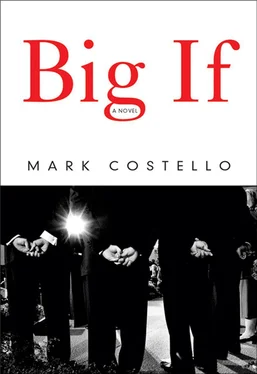They landed at a bomber base near Champaign, Illinois. The Army had a helo waiting on the skirt, sixteen seats and cramped at that. With the flacks, the press pool, a FEMA delegation, a local congresswoman, and the body team, there was no room for the SWATs, the snipers, or the techs, and no time for set-checking or site-prepping.
It was twenty minutes to the river, Fundeberg briefing the press pool on the Mississippi flood and other points of interest for their readers. Herc took out a deck of cards and dealt a hand halfheartedly to O’Teen, Tashmo, and himself, but their minds were elsewhere and after two misdeals, they packed the deck away and rode in silence. Bobbie looked pukey, belted in her seat. Felker, Vi remembered, seemed to fall asleep, utterly at peace.
Gretchen spent the flight on the downlink with St. Louis. The SAC had sent a team to Hinman, but the Alton bridge was out and his men were stranded in a motel office, still on the Missouri side, phoning in whatever they could learn from the PFR bands, from channel-surfing on the motelier’s TV, from browsing widely on the Web. The SAC passed along an unconfirmed report of scattered looting in the river towns.
“And that’s not all,” he said. The Illinois Department of Corrections had bused a work gang into Hinman, men convicted of light offenses only, and everyone pitched in, citizens and prisoners, their differences forgotten, building a sandbag dike against the rising current — a human-interest story, until a length of dike slid into the night. The water rolled and everybody fled. In Baker, down the road, sixty-seven members of a Christian encampment had ignored all entreaties to evacuate. The Christians never bothered anyone, but never paid their taxes either. The local IRS had been sitting on a warrant for a year, afraid to serve it (nobody needed another Waco). When the river started rising, three Illinois Guardsmen went door-to-door, looking for the shut-in, the elderly, and the blissfully oblivious. The Guardsmen were unarmed. They belonged to a supply battalion from the East St. Louis Armory. They pulled into the commune’s compound, thinking it was just another isolated farm. The Christians hadn’t personally seen any water other than the falling rain and they suspected that the whole state of emergency — complete with TV weather warnings and evacuation maps — was a law-enforcement hoax to draw them away from their arsenal, their C-rats, and their boobytraps. The arrival of the soldiers seemed to confirm these suspicions and the Christians opened fire. One Guardsman was shot through the wrist. The others were pinned down under their humvee by sniper fire from the guard towers and still the river rose.
A flying column of sheriff’s men, two cruisers and an ambulance, took off down the last dry road linking Hinman to the world. No one seemed to know where the deputies were headed. They may have been going out to round up the stray prisoners or maybe they were pushing on to Baker to relieve the hard-pressed Guardsmen. Gretchen only knew that the dike was gone and the river was at eighteen feet above normal, flooding Main Street, the state forest, and some farms, and dogs and pigs and supposedly some horses, and definitely deer, and all the other animals who couldn’t climb a tree, or float, or fly, were fleeing to the far side of the Baker-Hinman road. The lead car in the sheriff’s column, coming down this road, hit a herd of deer crossing to the farms, killing several instantly. The deputy jammed on the brakes and was hit from behind by the ambulance and killed instantly. The tail car swerved, shearing the ambulance and striking a light pole, injuring a deputy, who later died instantly. The scene along the road was a traffic horror — doe, buck, deputies, accordioned cars, the ambulance tipped over, medicine and bandages everywhere, none of which was really Gretchen’s problem, not even the Guardsmen, who were still under the humvee as far as anybody knew. Gretchen was thinking about looters, about riot, about fire and no firefighters and the end of 911.
They were bouncing through the thunderheads.
Fundeberg said, “Looters?”
“Sporting goods,” said Gretchen, seriously freaked and trying to explain.
Fundeberg said, “Gretchen, get a grip. This isn’t Watts. This isn’t Pakistan. This is just a town in Illinois.”
“Looting is a form of shopping,” Felker said. “There’s a pattern to it, Fundeberg. Every study shows this. Looters go for three things generally: liquor, home entertainment systems, and sporting goods — bats, knives, guns in the display case, ammo by the box. Even crossbows. There’s precedent for that.”
“Awesome,” said Herc Mercado, who was always up for something new.
“Once they get the sporting goods,” Felker said, “looters can turn themselves into a stubborn localized insurgency. How many prisoners are loose down there? Are they in possession of excessive sporting goods? We don’t even know. This is not a well-planned evolution. I think this is the point that Gretchen’s making.”
The helo dipped beneath the clouds, flying over squares of cultivated land. The river came up suddenly on the starboard side, coffee-brown, astonishingly broad, curling and uncurling, like twenty different rivers sharing the same banks. Vi saw houses, trailers, whole uprooted trees rolling in the currents. The helo hovered over half a town.
“The school is the magnet in this district,” Fundeberg was telling the reporters. “Reading scores are up, thanks to our aggressive program of Internet access.”
The reporters wrote this down.
“The gym has room for eight hundred cots,” said Fundeberg. “That’s well over half the town.”
The helo settled in the outfield of a soupy baseball diamond. A pitiful committee waited at the edge of the rotor-wash, the bedraggled mayor, a priest whose hat blew off, a two-man FEMA team. Vi and Bobbie were busy kitting up, racking Uzis, tapping ears, adjusting the straps on their body armor. Herc and O’Teen straightened each other’s ties.
“Right,” said Gretchen.
Quick check of the radios and they were out the door. A crowd of refugees pushed up. Vi and Felker pushed them back. Gretchen took the VP through the gap with Herc, Tashmo, and O’Teen, a box of four around him. They hustled up the hill to the magnet school with the FEMA dudes and the delegation from the town.
A light rain fell. Vi splashed across the grass, taking a position in the right-field power alley. She watched families stumble up from the town, carrying whatever they had rescued from the river. She saw young children with stuffed talking dinosaurs, men with rare and precious heirloom muskets, people saving their home encyclopedias, every family member carrying four volumes or as many as they could. She saw a woman with a small painted box marked Recipes and another woman in a dripping quilt carrying two goldfish in a bowl, the water sloshing as she walked. The woman held her hand over the open bowl, protecting the goldfish from the rain.
Vi heard Felker on the comm. He said that he was going for a look Gretchen was herding the protection to the school. She said, Look at what?
Felker was half static. He sounded far away. He said that he was going to the town.
Gretchen said, Felker, that’s a negative. Thirteen your ass right back here. “Thirteen” was borrowed cop code. It meant do it now.
Gretchen was hailing and recalling Felker all the way up the hill to the school, but Felker never copied back. Gretchen gave a final order before the gym swallowed her signal. She said, Vi, go find him — bring him back.
Vi cut through the refugees to the red clay warning track, past the scoreboard and the ten-foot foul pole, down a grass embankment. She lost her footing on the bank and slid on her ass to a gravel fire road.
Читать дальше












